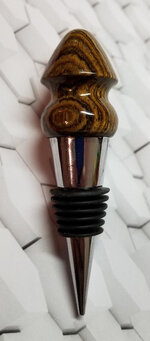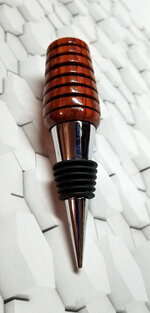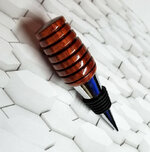What tap are you using , as there are three styles of taps. Starter, plug and bottom .
To get a good tap hole always first use the starter until it bottoms out and finish with a bottom tap.
Good point. Only argument is that I think most people user the term 'taper tap' rather than 'starter tap'. And the taps that you most often encounter on the rack at a hardware store are taper taps - plug taps and bottoming taps tend to be special-order items.
But I think the problem that OP encountered is that it is difficult to tap a hole drilled into
end grain. The grain is running parallel with the sides of the hole, and when you use a tap to cut threads in the sides, each thread is effectively a small ridge that is perpendicular to the direction of the grain. As a result, it is very easy for threads to shear off when they are subjected to stress.
Because a 'taper tap' is tapered, the cutting burrs are more shallow toward the tip of the tap. That means that as it works through a hole, it first cuts shallow threads that are subsequently made deeper as the tapping process proceeds. The tap actually rides on the threads it has already cut - that's how it maintains the pitch of the thread. But that also means that the initial threads have to withstand the stress caused by advancing the tap into the hole.
The problem when threading wood is that dry hardwoods are often also brittle. So now you have the situation where you are cutting shallow threads, and immediately stressing them as you advance the tap further into the wood. Depending on the species of the wood, and on how dry it is, it is not unusual for the process of tapping to actually just ream out the diameter of the hole, leaving only rough, shallow threads.
It's easier to tap holes in
face grain because the grain is parallel to the direction of the threads. As a result, each thread is stronger and more able to resist of the stress of the tap as it advances into the hole.
Threading a
blind hole with a taper tap alone leaves tapered threads - the threads are more shallow toward the bottom of the hole because the tap bottoms out before it can cut full-depth threads over the full depth of the hole. That can actually be an advantage in tapping stopper blanks because it means that the hole will have a tighter grip on the mandrel as the mandrel is screwed deeper into the hole. On the other hand, that can also mean that it's harder to remove the blank from the mandrel when you are done.



